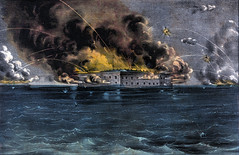HEADQUARTERS PROVISIONAL FORCES,
Charleston, S.C., April 13, 1861.
SIR: In obedience to orders from the commanding general, Beauregard, we left the wharf at 11.15 a.m., and proceeded in an open boat to deliver communications to Brigadier-General Simons, commanding on Morris Island, and passing under the batteries of Fort Johnson landed in the rear of Major Stevens’ battery. Our orders were specifically to ask information as to the condition of the batteries on the island, and any other facts necessary to be communicated from Brigadier-General Simons to the commanding general, and also to establish military communications by land from Morris Island to the city of Charleston. We were moreover instructed to learn the condition of Fort Sumter as far as practicable without unnecessary exposure, and if the bombardment and conflagration within had forced an evacuation by Major Anderson and his command.
At the period of passing Fort Sumter about 12 m. the firing from it had ceased, except occasional shots opposite Fort Moultrie, but was kept up with great precision and regularity by the batteries from Fort Johnson, Sullivan’s Island, and Morris Island. The conflagration of the officers’ quarters in the fortress appeared to be on the increase, and although the United States flag was still flying when we landed, there appeared no other evidence of the continuation of the contest.
After communicating with General Simons and establishing a land communication with the city, it was deemed advisable to send a flag to Fort Sumter and demand its evacuation, as at 1.10 p.m. precisely the United States flag had suddenly disappeared from its walls. While a white flag and the boat which bore us over was being made ready to take us, Colonel Wigfall, who had been detailed for special duties on Morris Island, thinking that no time was to be lost lest the garrison be destroyed, and accompanied by Private Young, of the Palmetto Guard, and two oarsmen, hastily entered a small skiff and pulled towards the fort with a white flag in his hand. Its size was too small to be distinctly seen by our batteries, and in consequence the discharge of neither shot or shell was discontinued by them, except those on Morris Island. His approach, therefore, to Sumter was one of imminent danger. We saw him after landing disappear into the fort through an embrasure. After the lapse of a short period of time he reappeared upon the pavement at the base of the fortification and re-embarked, directing his course to where we stood, at Major Stevens’s battery. Meantime the flag that had been erected after the flag-staff was cut away was taken down and a white flag run up in its stead. Before reaching the shore on his return Colonel Wigfall gave evidence that Major Anderson had consented to evacuate, which was soon after confirmed. He was received upon the beach by the troops, who for a moment rushed out to meet him, with strong evidences of admiration. We then took Colonel Wigfall with us in our boat, and returned to the city to report to the general commanding.
Brigadier-General Simons had no specific intelligence to communicate to the general commanding beyond the events narrated; but we take pride and pleasure in reporting the spirit, promptness, and energy which characterized the portion of his command inspected by us.
All of which is respectfully submitted for the information of the general commanding.
JAMES CHESNUT, Jr.,
Aide-de-Camp.
A. R. CHISOLM,
Lieutenant-Colonel and Aide-de-Camp.
JOHN L. MANNING,
Aide-de-Camp.
Maj. D. R. JONES,
Adjutant-General Provisional Forces.
